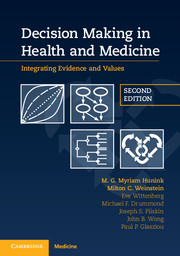Book contents
- Frontmatter
- Dedication
- Contents
- Foreword
- Foreword to the first edition (2001)
- Preface
- Acknowledgments
- list of Abbreviations
- About the authors
- 1 Elements of decision making in health care
- 2 Managing uncertainty
- 3 Choosing the best treatment
- 4 Valuing outcomes
- 5 Interpreting diagnostic information
- 6 Deciding when to test
- 7 Multiple test results
- 8 Finding and summarizing the evidence
- 9 Constrained resources
- 10 Recurring events
- 11 Estimation, calibration, and validation
- 12 Heterogeneity and uncertainty
- 13 Psychology of judgment and choice
- Index
- References
Foreword to the first edition (2001)
Published online by Cambridge University Press: 05 October 2014
- Frontmatter
- Dedication
- Contents
- Foreword
- Foreword to the first edition (2001)
- Preface
- Acknowledgments
- list of Abbreviations
- About the authors
- 1 Elements of decision making in health care
- 2 Managing uncertainty
- 3 Choosing the best treatment
- 4 Valuing outcomes
- 5 Interpreting diagnostic information
- 6 Deciding when to test
- 7 Multiple test results
- 8 Finding and summarizing the evidence
- 9 Constrained resources
- 10 Recurring events
- 11 Estimation, calibration, and validation
- 12 Heterogeneity and uncertainty
- 13 Psychology of judgment and choice
- Index
- References
Summary
… high Arbiter Chance governs all.
John Milton, Paradise Lost, book II, lines 909–10When the predecessor to this book was being prepared in the late 1970s (Weinstein et al., 1980), medical decision making seemed to have become more complicated than ever before. The number of diagnostic and therapeutic options dwarfed those of an earlier generation, and the costs of care were growing relentlessly. Increasing numbers of patients expected to play an active role in decisions that affected their lives, and many physicians were acclimating themselves to a less authoritarian doctor–patient relationship. The tools of decision analysis permitted the clinician and patient to break down the complexity of a medical situation into its constituent parts, to identify and assess the pertinent uncertainties and values, and to reassemble the pieces into a logical guide to action.
Today, a generation later, the dilemma of medical decision making seems even more problematic. This is not merely the result of scientific and technologic advances – ingenious new devices, pharmaceuticals, surgical possibilities, and other interventions. The environment of decision making has itself become confounded by government agencies and service delivery systems playing a more direct (and directive) role in decision making. Today, not only are the costs of care a prime concern, so, too, is the quality of care. Patients no longer need rely mainly on their physicians to gain access to medical information – the internet has given millions a direct line to abundant information, though of variable accuracy and pertinence. In light of progress in mapping the human genome, clinicians may soon face profound ethical questions that only a generation ago were the stuff of science fiction.
- Type
- Chapter
- Information
- Decision Making in Health and MedicineIntegrating Evidence and Values, pp. x - xiiPublisher: Cambridge University PressPrint publication year: 2014



